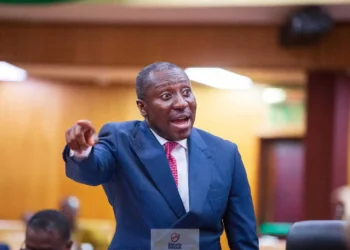In a bid to fortify the nation’s defenses against terrorism, the Centre for Intelligence and Security Analysis (CISA), a prominent non-governmental organization operating within the realm of security and intelligence, has issued a compelling call to action. CISA is urging the government to enact comprehensive counter-terrorism legislation, citing the imperative need for enhanced measures to combat the persistent threat of terrorism.
With an unwavering focus on safeguarding national security interests, CISA has long been at the forefront of analyzing and addressing emerging security challenges. The organization’s latest plea comes in response to evolving global security dynamics and the ever-changing tactics employed by terrorist organizations.
This call comes in the context of ongoing efforts to review and update terrorism legislation, as evidenced by the government’s responses to reports from the Independent Reviewer of Terrorism Legislation (IRTL). These responses have been published over the years, indicating a continuous process of evaluation and adjustment of terrorism laws to address emerging threats and ensure their effectiveness.
“The absence of the Foreign Fighters Act is worrying as more Ghanaian youth run to war zones, terrorist cells; and return as radicalized lone wolves or form sleeper cells. In 2015, a 25-year-old Ghanaian graduate, Mohammed Nazir Nortei Alema, was recruited by ISIS but later died in Syria. As more and more are recruited to the warzone, what happens if they return to settle back home?”
Mr Rasheed Inusah, the Chief Executive Officer of CISA and former Director-General of the National Intelligence Bureau (NIB)
At the heart of CISA’s advocacy lies a profound understanding of the intricate landscape of modern terrorism. The organization emphasized the critical importance of proactive legislative measures aimed at preempting and thwarting terrorist activities before they materialize into catastrophic events. According to CISA analysts, a robust legal framework is indispensable in empowering law enforcement agencies to detect, deter, and disrupt terrorist plots effectively.
Key components of the proposed legislation put forth by CISA include provisions for enhanced surveillance capabilities, streamlined intelligence-sharing mechanisms, and strengthened counter-radicalization efforts. Furthermore, the organization advocated for measures to address the root causes of extremism, underscoring the significance of community engagement and social cohesion initiatives in countering the spread of radical ideologies.
In a statement issued to the press, the leadership of CISA underscored the urgency of legislative action, emphasizing that the threat posed by terrorism continues to evolve in tandem with advancements in technology and changes in global geopolitics. They stressed that a comprehensive legal framework is indispensable in providing law enforcement agencies with the necessary tools and authorities to confront emerging threats effectively.
The call by CISA has reignited the longstanding debate surrounding counter-terrorism legislation, prompting policymakers to revisit existing frameworks and explore avenues for strengthening national security measures. Advocates argue that proactive legislative measures are indispensable in safeguarding the nation against the multifaceted threat of terrorism, while critics raise concerns regarding potential encroachments on civil liberties and privacy rights.
Urgent Actions Against Threat of Terrorism

As the government grapples with the complex task of balancing security imperatives with individual freedoms, the recommendations put forth by CISA are likely to serve as a catalyst for broader discourse and deliberation on the nation’s counter-terrorism strategy. In an era defined by unprecedented security challenges, the imperative for decisive action to fortify the country’s defenses against terrorism has never been more pressing.
“It is now time for most countries in Africa, especially Ghana, to consider the urgent need to address these concerns through the enactment of new counter-terrorism legislation (Foreign Fighters) Act. The FFA will bestow the law enforcement agencies with the powers to take effective action in advance of any terrorist act being committed.”
Mr Rasheed Inusah, the Chief Executive Officer of CISA and former Director-General of the National Intelligence Bureau (NIB)
Mr Rasheed Inusah, the former Director-General of the National Intelligence Bureau (NIB) expressed concern over the current economic situation in the country, warning that the phenomenon had made the youth more susceptible to foreign exploitation and outside predators.
He urged the Government to address the challenges, particularly the high youth unemployment situation, which currently stands at 12.2 percent, to curb future recruitment of the youth by those terror groups.
He called for adequate safeguards to strengthen the capabilities of the security and intelligence institutions to keep the country safe.
Touching on the responsibilities of the media to safeguard the electoral process, Mr Inusah said journalists must avoid sensationalism, fear-mongering, and dissemination of false information as those could pose national security threats.
He urged the media to prioritize their safety, especially at election hotspots, and ensure they remained neutral, focus on reporting the facts, and give an ear to all sides for a balanced reportage.
CISA’s call for new counter-terrorism legislation is part of a broader effort to enhance the country’s capabilities in combating terrorism. This effort is supported by the government’s ongoing engagement with the IRTL and its commitment to reviewing and updating terrorism legislation in response to expert reviews and changing security threats.
READ ALSO: IMF Forecasts Stable Global Growth of 3.2% for 2024























